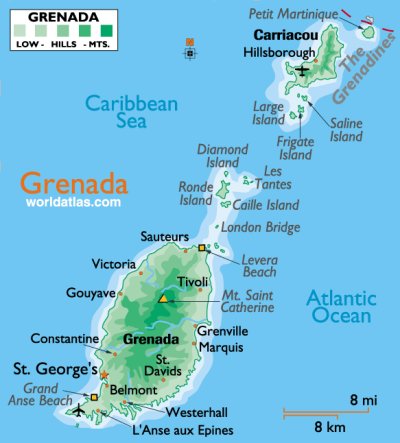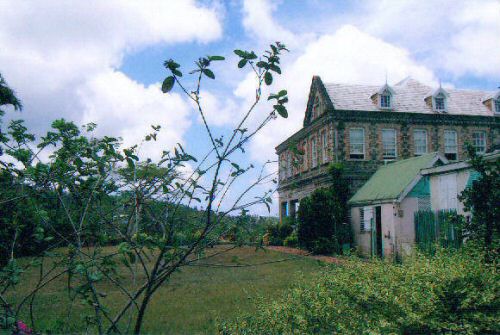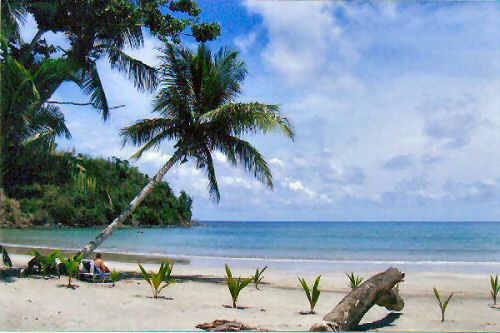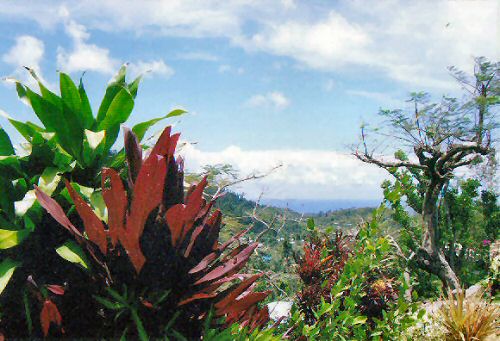On
his third voyage to the New World in 1498, Columbus sailed by Grenada
and named it Concepcion.

 The British attempted a small settlement in 1609, but it was the French that
successfully battled the cannibalistic Carib Indians, finally driving them
off the island in 1651.
The British attempted a small settlement in 1609, but it was the French that
successfully battled the cannibalistic Carib Indians, finally driving them
off the island in 1651.

 Military
and political struggles continued on the islands for two centuries, with
Grenada finally becoming an independent country in 1974. Military
and political struggles continued on the islands for two centuries, with
Grenada finally becoming an independent country in 1974.

 Then,
in 1983, Grenada was seized by a Marxist military group. This action
facilitated an invasion by US forces and those of six other Caribbean
nations; they captured the ringleaders and hundreds of Cuban advisers and
free elections were reinstituted the following year. Then,
in 1983, Grenada was seized by a Marxist military group. This action
facilitated an invasion by US forces and those of six other Caribbean
nations; they captured the ringleaders and hundreds of Cuban advisers and
free elections were reinstituted the following year.

 Grenada (the country) includes the large island of Grenada, and a few
islands on the southern edge of the Grenadines, with Carriacou and
Petit Martinique the most significant.
Grenada (the country) includes the large island of Grenada, and a few
islands on the southern edge of the Grenadines, with Carriacou and
Petit Martinique the most significant.

 Volcanic in origin, Grenada is dominated by a central ridge of mountains,
all covered with lush rainforests. The island is blessed with numerous bays
and harbors, and some of the best beaches in the Caribbean.
Volcanic in origin, Grenada is dominated by a central ridge of mountains,
all covered with lush rainforests. The island is blessed with numerous bays
and harbors, and some of the best beaches in the Caribbean.

 Once famed only for its indigenous spices (namely mace and nutmeg),
Grenada's modern focus is tourism, and the islands are deservedly garnering
the attention of the travel industry.
Once famed only for its indigenous spices (namely mace and nutmeg),
Grenada's modern focus is tourism, and the islands are deservedly garnering
the attention of the travel industry.

Population 94,000
 Capital
City St. George's (4,500) Capital
City St. George's (4,500)
 Languages
English (official), French patois Languages
English (official), French patois
 Official
Currency East Caribbean Dollar Official
Currency East Caribbean Dollar
 Religions
Catholic, Anglican, others Religions
Catholic, Anglican, others
 Land
Area 133 sq miles (345 sq km) Land
Area 133 sq miles (345 sq km)
|




![]() Capital
City St. George's (4,500)
Capital
City St. George's (4,500)![]() Languages
English (official), French patois
Languages
English (official), French patois![]() Official
Currency East Caribbean Dollar
Official
Currency East Caribbean Dollar![]() Religions
Catholic, Anglican, others
Religions
Catholic, Anglican, others![]() Land
Area 133 sq miles (345 sq km)
Land
Area 133 sq miles (345 sq km)